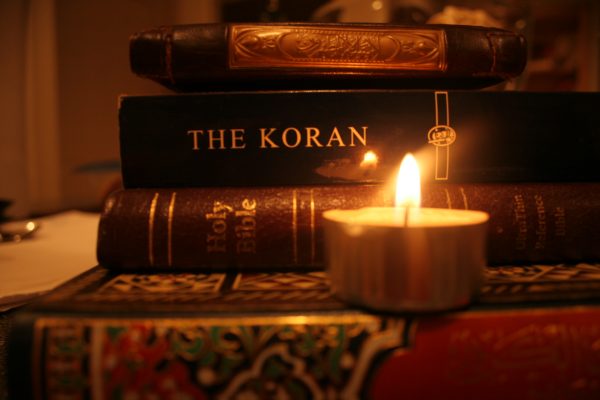Message for the International Day Against Homophobia
 Today is the International Day Against Homophobia and Transphobia and AOBM would like to make a small contribution to this important day. Here is a short correspondence between Paul Salahuddin Armstrong, Co-Director of the Association of British Muslims and I, a British Muslim about LGBT people and faith, we hope it can help a spread a message of acceptance and understanding.
Today is the International Day Against Homophobia and Transphobia and AOBM would like to make a small contribution to this important day. Here is a short correspondence between Paul Salahuddin Armstrong, Co-Director of the Association of British Muslims and I, a British Muslim about LGBT people and faith, we hope it can help a spread a message of acceptance and understanding.
To Paul from I:
assalaamu alaykum
I also am against those posters that were put up in london. i dont see any benefit in them. i do not disagree with the content only the methodology used to preech that message. I hate the sin not the sinner
the BBC has quoted your organisation as saying that homosexuality is not forbidden in the Quran. “There is nothing in the Koran against Lesbian Gay Bisexual Transgender (LGBT) people,” said Mohammed Abbasi, co-director of the Association of British Muslims.
http://www.bbc.co.uk/news/uk-england-london-12526820 after reading this i began to read the articles on your website
below are quran ayats directly mentioning men having sex with men
“We also sent Lut : He said to his people : “Do ye commit lewdness such as no people in creation (ever) committed before you? For ye practice your lusts on men in preference to women: ye are indeed a people transgressing beyond bounds.” Quran 7:80-81
Allah Most High says: “Do you approach the males of humanity, leaving the wives that Allah has created for you? But you are a people who transgress” Quran 26:165-66
jazakallahu khaira
I
To I from Paul:
Salaam alaikum I,
Thank you for getting in contact with us. I understand your perspective on this, it is indeed one shared by many Jews, Christians and Muslims alike. In reference to the Qur’anic ayats you’ve quoted, I have read the Qur’an and wasn’t unaware of these verses. However, the key as always is in the interpretation. If someone is already biased against LGBT people, it’s pretty obvious how they’re likely to interpret the verses. On the other hand, if one starts out with an open mind and reflects upon what the verses are actually saying, one can see there is far more to them than initially meets the eye…
Consider, “Do ye commit lewdness such as no people in creation (ever) committed before you?” – Homosexuality is not new and has been known to be around since the very earliest days. So, what could this sentence mean? Surely, the “lewdness” alluded to here, is something very much out of the ordinary, something far more strange than private relationships between LGBT people. No, this indicates something more akin to public orgies, in which it wouldn’t matter whether hetero or homosexual acts were taking place. Most people, gay or straight would find this offensive and completely unacceptable.
Another point to consider is the second part of the same ayat – would it be okay to practice our lusts on women? As in Judaism and Christianity, any kind of sex outside of marriage has traditionally been regarded as sinful in Islam. That is not to say it never happened of course, but this was the line scholars and clerics adopted in many religious traditions, not only Islam. The Qur’an doesn’t say anything specifically about “LGBT” people, the term isn’t even found in the Holy Qur’an. From what we read about the people of Lot (Lut), their society had a lot of issues… As the text implies, the people were basically having orgies in the streets, and not limiting their sexual practices in any respects – even wanting to have sex with the angels who were visiting Lot, basically wanting to rape them. I do not see how this remotely compares with civilised LGBT people today. The two scenarios are really quite different!
All the very best, wa Salaam,
Paul
From I to Paul:
wasalaam
The best thing for the both of us to do is to sit at the feet of a scholar of islam and learn from him. if we are unable to do that then we should use reliable (tafaseer) commentaries of the quran.
I have no bias as I used to be a athiest darwinian before becoming muslim and i hate the sin not the sinner.
Your approach of being open minded is an excellent one however we should not accept haram as halaal in this endevour.
From Paul to I:
Salaam alaikum I,
Masha Allah. I agree, we should learn from authentic scholars and reliable sources. I have myself been studying Islam for over 11 years, both sitting with scholars such as Shaykh Sufi Muhammad Abdullah Khan, Shaykh Hamza Yusuf Hanson, Imam Zaid Shakir, Shaykh Abdul-Hakim Murad, Imam Abdassamad Clarke, Shaykh Abdur-Raheem Green, Shaykh Tahir-ul-Qadri and Shaykh Hisham Kabbani, as well as studying the works of Imam Malik, Imam Ali, Imam Bukhari, Imam Muslim, Imam Ghazali and the writings of more contemporary scholars such as the ones I mentioned previously and others like Abu Ameenah Bilal Philips, Shaykh Abu Muntasir etc. There is really no substitute for seeking knowledge and understanding oneself.
We should study and reflect as much as we are able, so that as far as is possible, we understand Islam ourselves and do not become overly reliant upon any particular scholars or groups. To err is human and the scholars are human. Each of these scholars also has a cultural background and has studied in particular cultural environments which may also affect their understanding of Islam. Which is why they themselves vary quite markedly in their views. A wise approach to studying the deen, is to ask Allah for guidance, study widely and always refer back to the Holy Qur’an, which is unique in being the divine, pure guidance from Allah. Everything else has been touched by human hands and is thus therefore prone to human error and other faults.
May Allah forgive me if anything I’ve said is wrong… All guidance comes only from Allah and any mistakes are my own.
All the best,
Paul


